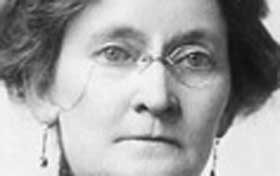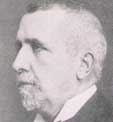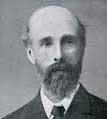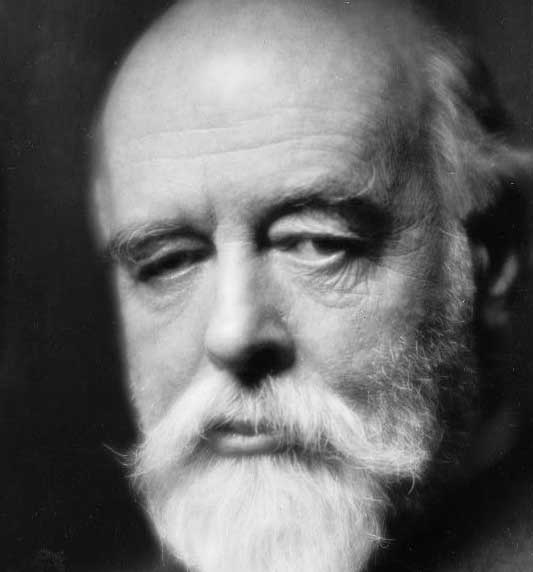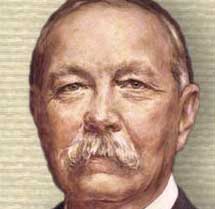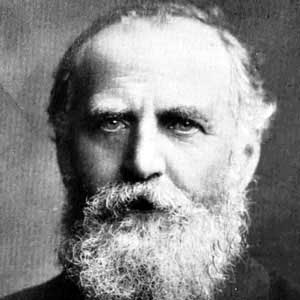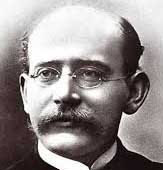Henrietta ‘Etta’ Wriedt (c 1859–1942) was an American ‘direct-voice’ medium living in Detroit, Michigan. Detailed accounts of her mediumship were published by Dr John King, founder of the Canadian Society for Psychical Research, and Vice-Admiral William Usborne Moore, a member of the London-based Society for Psychical Research (SPR). Others who attested to her genuineness included William Barrett, Oliver Lodge, Arthur Conan Doyle, Charles Tweedale, and William Thomas Stead.
Contents
Background
Little is known about Wriedt’s early life. Her year of birth is thought to be either 1859 or 1860. Several references state that she was born in Detroit, Michigan, but she told King she was born in New York State, moved to Ohio at an early age, and only later moved to Detroit.
Moore, a retired British naval officer turned psychical researcher, attended sittings with her in 1909 and 1910. He later said these early experiences were relatively unimpressive compared with sittings he attended in 1911. As he understood it, her mediumistic abilities were greatly enhanced in 1910, following her recovery from a neurological illness that was initially thought to be terminal.
Moore described her as a slightly-built, delicate woman who suffered from bronchitis and neuritis. He noted that she had no servant and was assisted in the housework by her husband. As she charged one dollar per sitting she was considered a professional medium.
Nature of Wriedt’s Mediumship
Unlike many other seance mediums of the period, Wriedt did not enter a trance state and was often witnessed talking to other sitters as voices were heard speaking through a metal cone or ‘trumpet’ (a simple amplification device). Sittings often took place in subdued light, but the voices were said to be stronger in complete darkness. It was reported that as many as four ‘spirit voices’ might be talking simultaneously to different sitters.
Like Home (but unlike some other mediums of the period), Wriedt did not require to be concealed in a ‘cabinet’ (usually a curtained recess), but sat openly with the group.
Wriedt knew only English – ‘Yankee English,’ according to Moore. Despite this, the voices were heard talking intelligibly in French, German, Italian, Spanish, Norwegian, Dutch, Arabic and other languages.
Although Wriedt was primarily a direct-voice medium, she produced séance phenomena of the type witnessed with mediums such as DD Home: phantom forms, anomalous movements of objects, and touches by ‘invisible fingers’. Wriedt also displayed clairvoyant and clairaudient abilities.
Wriedt’s primary ‘spirit control’ was a Dr John Sharp, who stated that he was born in Glasgow during the eighteenth century, then was taken to the US as an infant and died in Evansville, Indiana.‘Dr. Sharp’ sometimes spoke through the metal cone; at other times, his and other voices were strong enough to be heard without its aid. Typically, Sharp would open the séance in a loud, clear voice and would similarly bring it to a conclusion.
Moore said:
We are told by Dr. Sharp that the power to speak is obtained from the sitters, and that they succeed or fail according to what “they are able to give out”, that some people give out freely, others not at all, and that his medium is not “drawn upon” more than is absolutely necessary.1Moore (1911), xx.
Moore added that there were many blank sessions and some very poor ones, which he saw as evidence contributing to the genuineness of Wriedt’s gift.
At the invitation of the journalist Stead, Wriedt visited England in 1911 and gave sittings there. So impressed was Stead and members of his Julia’s Bureau, an organization he formed for the study of mediums, that she was invited back in 1912. Stead was on his way to America to accompany her to England for the return trip when he became a victim of the Titanic disaster. However, she agreed to urgings by members of Julia’s Bureau to make the trip without him, and gave more demonstrations in 1912 and the following year.
Testimonies
Chedo Miyatovich
One communication reported by Moore was received by Count Chedo Miyatovich, a Serb diplomat, who sat with Wriedt on May 16, 1912 at Wimbledon.Miyatovich stated that he and a friend named Dr Hinkovitch sat near each other in the centre, Wriedt sitting on a chair near him.
She placed a tin speaking-tube (megalophon) in front of my friend.She started an automatic musical clock and put all the lights out, so that we sat in perfect darkness.
When a beautiful melody of a somewhat sacred character was finished by the clock, Mrs. Wriedt said to us that conditions were very good, and that we should be able not only to hear, but also to see some spirits. ‘Yes,’ she continued, ‘here is the spirit of a young woman.She nods to you, Mr. Miyatovich; do you not see her?’I did not see her, but my friend saw a piece of oblong and illuminated fog. ‘She whispers to me,’ continued Mrs. Wriedt,’ that her name is Mayell – Adela or Ada Mayell.’
I was astounded.Only three weeks ago died Miss Ada Mayell, a very dear friend of mine to whom I was deeply attached. But in that moment there was no other manifestation of her. She disappeared without saying anything more except her name.
Next moment a light appeared from behind the medium, and moved from the left to the right of the cabinet, as if carried by a soft breeze.There, in that slowly moving light, was not the spirit but the very person of my friend William T. Stead, not wrapt in white wrappers, as I have seen spirits at other séances, but in his usual walking costume! We both, I and Mrs. Wriedt, exclaimed loudly from joy.My friend Hinkovitch, who only knew Mr. Stead from photos, said: ‘Yes, that is Mr. Stead!’2Moore (1911), 3-6.
Stead then told Miyatovich that Ada Mayell wanted to speak. ‘She then spoke to me in her affectionate and generous manner, trying to reassure me on certain questions which had sadly preoccupied my mind since her death,’ Miyatovich further reported, mentioning that Ada referred to letters sent to him by her sister and niece. He continued:
Then, to my own and my Croatian friend’s astonishment, a loud voice began to talk to him in the Croatian language. It was an old friend, a physician by profession, who died suddenly from heart disease. They continued for some time the conversation in their native tongue, of which I heard and understood every word. Mrs. Wriedt, for the first time in her life, heard how the Croatian language sounds. I and my Croatian friend were deeply impressed by what we witnessed that day, May 16th. I spoke of it to my friends as the most wonderful experience of my life.3Moore (1911), 6-8.
Miyatovich then arranged for Professor Margarette Selenka, a friend of Stead’s who happened to be in London at the time, to sit with Wriedt on 24 May. He accompanied her, while two others were present. Miyatovich stated:
After a short time from the beginning of the séance, we all saw Mr. Stead appear, but hardly for more than ten seconds. He disappeared, to reappear again somewhat more distinctly, but not so clearly as he appeared to me on May 16.
Stead then had a long conversation with Selenka and a short one with Miyatovich, reminding him of an incident two years earlier in his office at Mowbray House. Ada Mayell again spoke, followed by Miyatovich’s mother, who spoke in her own Serbian language. Selenka then heard from her deceased husband, Professor Lorentz Selenka, and her mother, who died a year earlier, both speaking in German. A male friend of Selenka sang a German song, and asked her to join him, as they used to sing together in the old days, after which a number of spirits came for the other two sitters.4Moore (1911), 8-9.
William Barrett
While in England, Wriedt was occasionally controlled by ‘John King’ (Sir Henry Morgan when alive, not to be confused with Dr John S. King mentioned above and below) as it was explained that he was better acquainted with English people than Dr Sharp. Grayfeather, a North American Indian, also controlled at times.
Moore’s book includes testimony by William Barrett, professor of physics at the Royal College in Dublin. He heard from a number of others, then heard from ‘Sidgwick.’ He asked for the man’s Christian name and the voice responded, ‘Henry Sidgwick.’ Henry Sidgwick had been a personal friend of Barrett’s and was the first president of the Society for Psychical Research. Barrett asked if he was all right now. ‘Sidgwick’ replied: ‘You mean the impediment in my speech, but I do not stutter now’,5Moore (1911), 86. an accurate reference to Sidgwick when alive.
John S King
King, an Ontario physician, sat with Wriedt in November 1911, 44 days after the death of his wife May. He was immediately greeted by the voice of Dr Sharp.
He pointed out that I could not do much for the departed spirit, but that it could do much for me; that my worrying and fretting, or sorrowing, would only tend to hinder or delay her progress or advancement. He also advised me to take care of myself, told me that Hypatia, my spirit guide, was with her (May) and would speak with me.6King (1920), 81.
A deceased physician communicated briefly and then King’s nephew, Jesse, spoke, offering evidential information while also telling King that it might be too early for ‘Auntie May’ to speak clearly or distinctly.Jesse was followed by Hypatia, who said that she had brought May.
Johnnie! Oh Johnnie!My dear Johnnie! It is I.It’s May!It’s your “Babe!”I am not dead, I am alive.I told you I would come if I could, and I am here.7King (1920), 83.
King commented that the names ‘Johnnie’ and ‘Babe’ were private pet names known to no one else.
May spoke with King for some fifteen minutes about personal matters, alluding among other things to the fact that he had placed jewelry and other of her personal belongings in a safety deposit box (King had done this two days earlier). She referred to relatives and friends by name, asking for her thanks to be conveyed to one particular person for having helped prepare her body for burial – another item of information that King was certain the medium could not have known. ‘She talked as naturally about these things as she ever conversed with me in her home life, and she was always known as a shrewd business woman,’ King wrote.8King (1920), 83.
Charles Tweedale
Charles Tweedale, an Anglican priest and Vicar of Weston, told of his sitting with Wriedt on 3 June, 1912:
During the course of this wonderful experience a voice announced itself as Frank Woodward and enquired for my wife, and spoke to her. This astounded her, for Frank Woodward was her former music master, of whom she had not heard for seventeen years, and who lived in the extreme north of England. Enquiry afterwards revealed the fact that he had died a year previously.9Tweedale (1947), 260.
According to Tweedale, Oliver Lodge sat with Wriedt on 14 August, 1920, in daylight, and heard voices. Tweedale quoted Lodge as saying: ‘I know that Wriedt is genuine.10Tweedale (1947), 270.
Arthur Conan Doyle
Arthur Conan Doyle reported on a sitting with Wriedt, where deceased friends communicated, giving good evidence of their identities. One individual, a rather irritable Anglo-Indian, spoke exactly as he had in life, giving his name and alluding to facts of his lifetime.11Doyle (1926), 202.
Florence Barrett
Geraldine Cummins, a medium and author, stated that Florence Barrett, obstetrician and wife of William Barrett, told her she became convinced of survival through her sittings with Wriedt. Barrett heard many evidential facts uttered by the voices, but what impressed her more was that, when her relatives purported to communicate, ‘the rather peculiar intonations of their voices were unmistakably reproduced.’12Cummins (1951), 90.
ER Johnson
Moore gives the detailed testimony of Colonel ER Johnson, a personal friend who attended seven séances with Wriedt in England during 1912. Of these two involved about ten people, while the other five were private, between the medium and Johnson himself.
Johnson reported:
The first séance, a private one, was in full daylight. The second, also private, was held in the red light of two shaded electric lamps, and the other five, including the two public séances, were in absolute darkness …
At the five private séances, I was only addressed by one voice that I could not hear sufficiently well to identify him or her. This was the first voice heard at the daylight séance.All the others were identified with certainty. They consisted of seven relatives, some of whom spoke only once, others on three or four occasions. Several times the individual conversations must have lasted from twenty minutes to half an hour, and related to incidents and events which could not have been known to the medium, and in some cases to anybody now living except myself. References were made to objects that have disappeared for twenty or thirty years, which were accurately described, and, on the other hand, to conversations and events which took place between séances.
Besides relatives, I was spoken to by seven personal friends and acquaintances, and three of these asked me to carry messages to living people.In one case, an incident was referred to which was entirely unknown to me, but which I afterwards ascertained to be quite correct … 13Moore (1913), 53-54.
At one sitting, a man who had recently died asked Johnson to convey a message to his widow. Johnson did so, but at the following séance, the same man communicated and told Johnson that he had not given the message correctly, then repeated it. In rereading his notes from the first sitting, Johnson discovered his error.
Fraud Allegation
Relatively little sceptical comment exists on Wriedt compared with other high-profile mediums. The most frequently quoted incident appears to be a claimed ‘exposure’ in 1912 at the hands of the Norwegian physicist Kristian Birkeland, who took part in investigations of mediums organized by the Norwegian Society for Psychical Research.
[Birkeland] jumped up, switched on the electric light, and, before the Spiritualists could interfere, had snatched the two trumpets from the floor … So the curtain fell onone more glorious act in the Spiritualist drama. Mrs. Wriedt had put in the trumpet particles of metallic potassium which, meeting the moisture she had also thoughtfully provided, explained the “psychic movements.” Close examination disclosed that on other occasions she had used Lycopodium seeds to produce the same effect.14 McCabe (1920), 126.
Whatever the exact circumstances, as is often the case with such assertions, the account bears little or no relation to what was observed in sittings with Wriedt, as reported by many credible witnesses.
Michael Tymn
Literature
Cummins, G. (1951). Unseen Adventure. London: Rider and Co.
Doyle, A.C. (1926). The History of Spiritualism, vol. 2. London: Cassell & Co., Ltd.
King, J.S. (1920). Dawn of the Awakened Mind. The James A. McCann Co.
McCabe, J. (1920). Is Spiritualism Based on Fraud?: The Evidence Given by Sir A.C. Doyle and Others Drastically Examined. London: Watts & Co.
Moore, W. U. (1911). Glimpses of the Next State. London: Watts & Co.
Moore, W. U. (1913). The Voices. London: Watts & Co.
Tweedale, C.L. (1947). Man’s Survival after Death. (4th ed., vol. 2). London: The Psychic Book Club.
